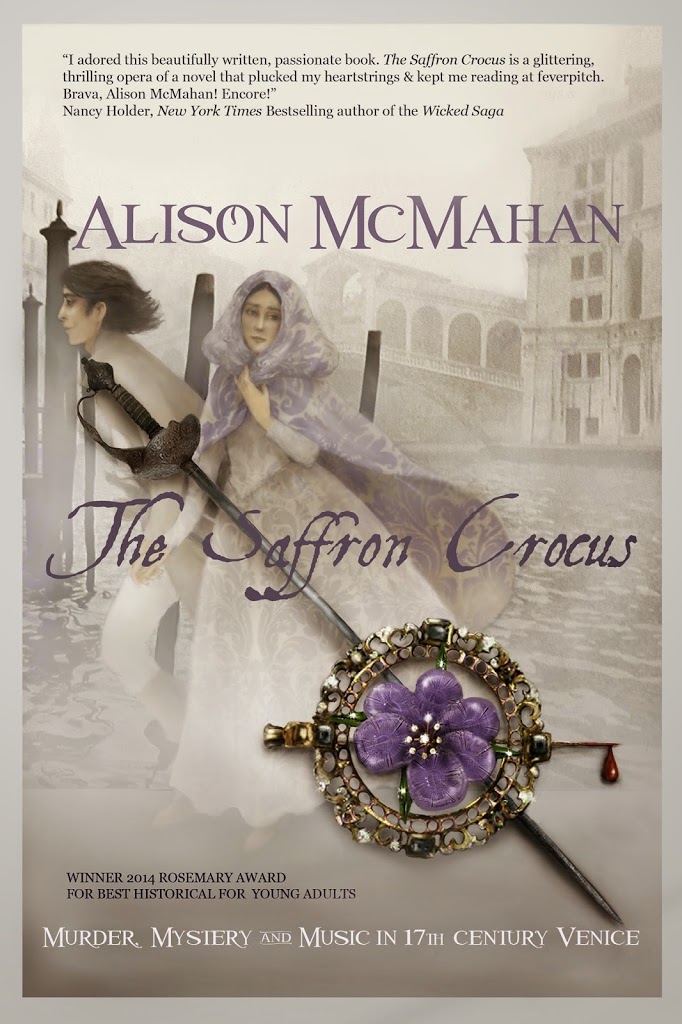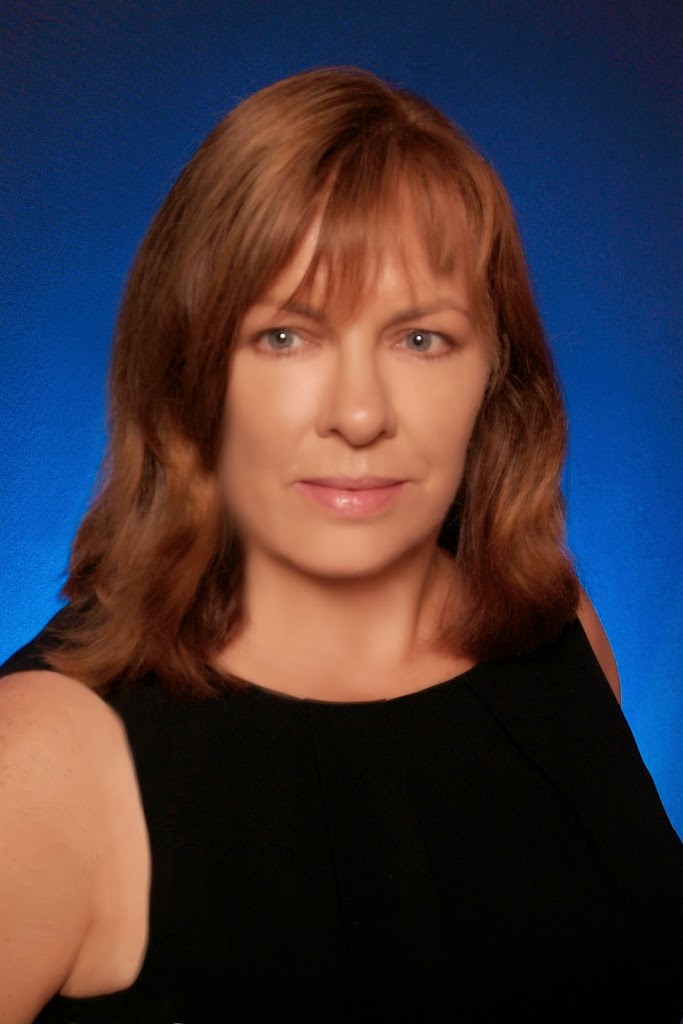Writing can be a lonely business. Cue world’s smallest violin. That’s probably why so many critique groups and critique partnerships exist. When I was at Stonecoast (MFA program extraordinaire), I met and befriended a lot of amazing writers. Three years later, many of us continue to stay in touch by Skyping, talking, and exchanging work. This process has a lot of benefits for me as a writer, and quite often for me as a reader. Nothing is cooler than getting to watch a great novel transform into something truly spectacular. That’s what happened with my friend and critique partner, Alison McMahan and her novel, The Saffron Crocus. The Saffron Crocus is a great romantic, suspense read. And it won the prestigious YARWA Rosemary Award for best historical novel in 2014. Woot!
Today, I get to do one of the most rewarding blog-related things. I get to interview a friend about a work that is both spectacular and dear to my heart.
DMS: Okay, so here I admit to having a huge crush on the male lead in The Saffron Crocus, Rafaele. Swoon. Not only can he sing, but he can fight. Swordfight. So how did you go about researching sword fights and figuring out how to make those intense action scenes seamless and believable?
AM: In 2013 I went to the Historical Novel Society for the first time. HNS is a great organization if you write historicals. At that conference, a writer named David Blixt, who has published many historicals but is also a stage actor, gave a workshop on stage combat. Combat in the middle ages with the broadsword. Combat in the Viking era with an axe. And combat in the baroque period with rapiers. (David is teaching two combat workshops at the next HNS Conference in Denver in June.)
I was instantly smitten. Not with David, though he is a fine specimen of gladiatorial manhood, both on paper and in person, but with swordfighting. I came home and looked up fencing schools in my area. I went to one and took classes for three months one summer. Most of the other students were fourteen, which made me old enough to be, uhm, well, I’m not going to admit it, but you know, I wasn’t their peer. It was quite funny to have a thirteen year old gravely point out an error I was making and say to me, “Don’t feel bad, I made that mistake when I started out too.”
When I was too sore to practice fencing, which seemed to be all the time, I read fencing manuals such as Nicoletto Giganti’s VenetianRapier, or Edward Blackwell’s A Compleat System of Fencing; or, The Art of Defence, in the Use of theSmall-Sword.
Once I had choreographed the fight scene I then ran it by seasoned fighters, not just fencers, but people who teach self-defense. Because modern fencing has a lot of gentlemanly rules that the characters in my book don’t follow, since their goal is to kill each other.
DMS: The theme of The Saffron Crocus has a lot to do with music as it relates to finding your voice. Not only the main characters Isabella and Rafaele, but other characters find their voices, find a way to express themselves. So when one of the characters is choked to death, the symbolism of her voice being literally stopped, seemed very dramatic to me. As a writer, and all readers want to ask authors this, does it bother you to kill off characters? And are you conscious of using the symbolism of this death, in this case choking?
[SPOILER ALERT: This answer contains a spoiler, but it happens early in the story.]
AM: I hated killing off the singing teacher, especially so early in the story. But the book is a murder mystery so someone has to die, and it has to be someone the protagonist, and therefore the reader, cares about. So my first job was to fall in love with her, and my second job was to kill her.
I’m thinking of writing a prequel that gives us that character’s adventures, and her love story. Because I really do feel bad I killed her off, you know?
DMS:The Saffron Crocus is a mystery, but is also considered a young adult, historical romance. Did you go about to purposefully craft a novel that would appeal to a younger audience or did you write younger characters knowing the YA market has become more mainstream, attracting a wider audience?
AM: I started out to write a young adult historical. I was inspired by the YA historicals I read as a teen, books like Witch of Blackbird Pond especially. When I started the novel I was conscious of wishing there were more YA historicals for people to read. They seem to be making a comeback now, with books like Codename Verity and Book Thief, but few people seem to write YA set further back in the past.
I always knew it would be a mystery. The romance aspect was unplanned. The characters fell in love without any help from me. You just can’t stop teenage hormones.
DMS: What about this time period in Venice drew you to it? Was it the city, the music, or some article or tidbit that first riveted your attention?
AM: 1643 is ten years after the Black Plague decimated Venice. It is also when Monteverdi was the musical director for St. Marco’s Basilica. At this time the first operas were being written and performed. One of Monteverdi’s operas is featured in the story. Sadly, L’Arianna is a lost opera, all we have is the music for one aria.
DMS: Can fans of The Saffron Crocus expect to see more of this time period and city and perhaps even Isabella and Rafaele? And if not, what work can we look forward to from you in the future?
AM: I’m working on another YA historical entitled The Circassian Slave Girl. This one is set in 1483. The hero is another Venetian merchant, like Rafaele, but the story is set mostly at sea, on the island of Rhodes, and in Istanbul. There is a ship battle, some dagger fighting, and a lethal fight over a game of cards. It’s more cloak-and-dagger than Saffron Crocus, more about people walking around with secret agendas.
I’m also rewriting a historical mystery for adults set in the time of the first Crusade. That one contains straight out murder, with daggers, poison, you name it, as well as some historical skirmishes and battles rendered in gory detail. So if you are looking for more knife fights, along with some bloody battles, look for The Road to Santiago (working title).
AlisonMcMahan is an award-winning screenwriter and author. Alice Guy Blaché, Lost Visionary of the Cinema (Bloomsbury 2002), won two awards, was translated into Spanish, adapted into a play, and is now being produced as a documentary by a Hollywood production company.
McMahan has trudged through the jungles of Honduras and Cambodia, through the favelas of Brazil and from racetracks to drag strips in the U.S. in search of footage for her documentaries. She applies the same sense of adventure to her books of mystery and romantic suspense for teens and adults. www.AlisonMcMahan.com

